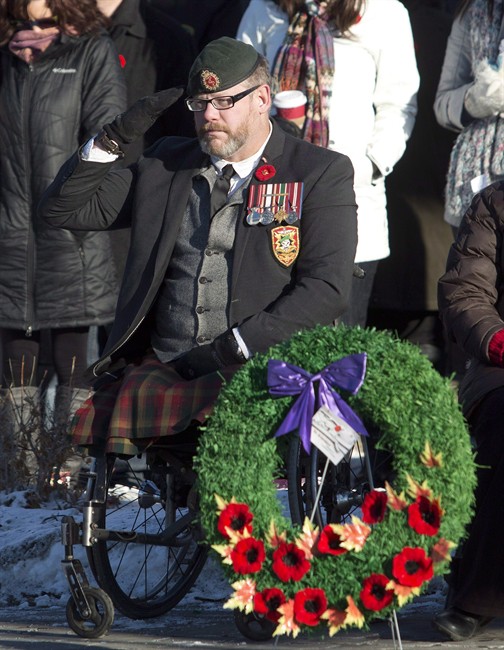TORONTO – It took about a year for retired Master Cpl. Paul Franklin to accept the fact that he’ll spend the rest of his life in a wheelchair.

A suicide bomb in Afghanistan destroyed his legs and left him a double amputee above the knee. The blast also killed Canadian diplomat Glyn Berry, while two other passengers in the car Franklin was driving were severely injured.
While Franklin has come to terms with his fate, his wife, who was never sent to Afghanistan, still struggles.
Franklin says she suffers from secondary post-traumatic stress from the incident — a little-discussed condition in which post-traumatic stress disorder symptoms emerge after indirect exposure to trauma, such as the experiences of an injured loved one.
“We actually separated because of the blast and because of her PTSD, so it’s unfortunately part of the deal that you get,” says Franklin, nearly 10 years after the January 2006 blast.
Franklin’s experience is one of several featured in a new season of the HISTORY series “War Story,” which this year focuses on Canadian soldiers deployed to Afghanistan.
Other events detailed in the half-hour show include a devastating friendly fire incident, Canada’s involvement in NATO’s largest-ever battle, the longest kill shot achieved by a sniper, a horrific axe attack on a Canadian soldier, and the emotional repatriation of fallen soldiers.
The six-part season premieres Monday with two back-to-back episodes and continues daily through Remembrance Day.
Canada’s new Minister of Defence, the Hon. Harjit Sajjan, will be featured Tuesday’s two back-to-back episodes.
“When we landed in Kandahar…it was quite the eye-opener,” the Afghan combat veteran recalls in one of the episodes.
“The enormity of the mission really kind of hit home and what Canada was actually involved with.”
READ MORE: Meet Harjit Sajjan: Canada’s new defence minister and Afghan combat veteran
“War Story” director Barry Stevens notes this is the first time the show will explore Canada’s experiences in Afghanistan, after the previous three seasons focused mostly on the Second World War.
He describes this conflict as much more difficult in its military aims and development goals, with Canadian soldiers facing an almost impossible job in especially dangerous conditions.
“At one moment they’re waving and smiling at kids when they go outside the wire (to talk) to villagers and councils, and the next moment somebody’s riding up on a bicycle with explosives strapped to him blowing you up, or in the case of (Capt.) Trevor Greene, sinking an axe into your head while you’re sitting down having a cup of tea,” says Stevens.
“So it was difficult for the soldiers to (say), ‘We’re here to help.’ And as one guy said, you have to fill your heart with hate.”
The final episode looks at the “Highway of Heroes,” a stretch of highway through southern Ontario where military caskets travel after landing at Canadian Forces Base Trenton for a repatriation ceremony.
The episode features retired captain Wayne Johnston, who worked as a national repatriation officer from 2008 to 2010 co-ordinating all aspects of a fallen soldier’s return.
“The job turned me into a bit of a pacifist in that you see the real sacrifice,” Johnston says by phone from his home in Brooklin, Ont.
“To me, November the 11th is for the fallen, the rest of the year is for those they leave behind, you know what I mean? The injured, the mother whose only child was lost and she’ll never see grandchildren. That’s pretty serious sacrifice.”
Dealing with such grief has taken its toll. Johnston says he was diagnosed with post-traumatic stress disorder, anxiety, and severe depression. He’s battled alcohol abuse and “moral compass malfunction” because of mental health issues, citing a period of time in which he wore military medals he didn’t earn.
“There’s just some days you’re overcome with sadness. I’m not looking forward to Remembrance Day,” says Johnston.
Franklin was glad to see “War Story” include references to the impact war has on families and friends, saying there isn’t enough discussion about how spouses, children and parents can be sent reeling from battle, too.
He and his wife split in 2009, but she still battles grief over his injuries and stress from witnessing his night terrors — which he doesn’t recall himself. She, too, would have nightmares.
“She was having bad dreams of Kandahar — of course never having been there — but (she felt) the sights, smells, the blood, the whole piece,” says the 48-year-old Edmontonian, who adds he had to battle Veterans Affairs for disability payments.
“And then I used to be a runner and a climber and all that other stuff so she felt horrible that I would no longer be able to do those things. It just builds and builds to a point where it broke.”
READ MORE: No solution yet for injured veterans forced to repeatedly prove amputated limbs are still missing
HISTORY’s schedule Monday through Wednesday will be dedicated to honouring those who served their country.
The documentary series “War Junk” returns for a third season on Sunday with military historian David O’Keefe and history buff Wayne Abbott heading to Juno Beach, Vimy Ridge, Monte Cassino and the battlefields of northern Holland, which Canadians helped liberate in the spring of 1945.
And the channel will also repeat past Canadian productions including “D-Day to Victory,” “Dig WW2,” “Air Aces,” “Camp X: Secret Agent School,” “The Great Escape: Secrets Revealed,” “Storming Juno,” “Dieppe Uncovered,” and “28 Heroes.”
HISTORY is owned by Shaw Communications Inc., parent company of Global News.
With files from Global News

Comments